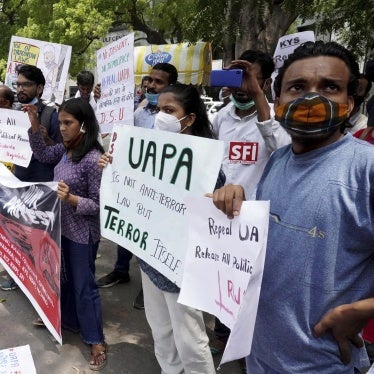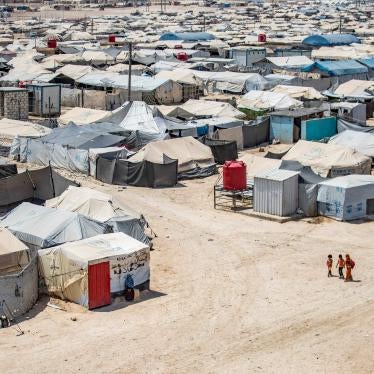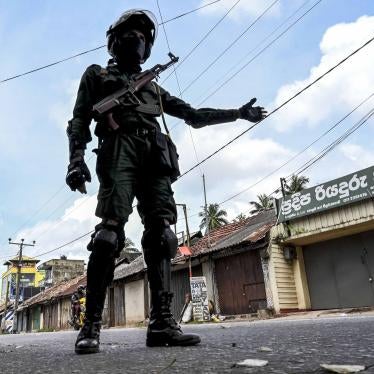The Indian parliament is currently debating the enactment of legislation that would reinstate a modified version of the Terrorists and Disruptive Activities (Prevention) Act (TADA) of 1985 (amended 1987). TADA led to tens of thousands of politically motivated detentions, torture, and other human rights violations. In the face of mounting opposition to the act, India’s government acknowledged these abuses and consequently let TADA lapse in 1995. But in response to national security concerns, and as relations with Pakistan deteriorate and violence in Kashmir and elsewhere escalates, the Indian government has introduced the Prevention of Terrorism Ordinance (POTO). On October 24, by means of an emergency constitutional provision, President K.R. Narayanan signed the ordinance into law. To remain in effect it needs to be approved during the current session of parliament where it will likely face considerable resistance by opposition parties. The session began on November 19.
The Prevention of Terrorism Ordinance sets forth a broad definition of terrorism that includes acts of violence or disruption of essential services carried out with "intent to threaten the unity and integrity of India or to strike terror in any part of the people." It also extends existing law by making it a crime not to provide authorities with "information relating to any terrorist activity."
The government used TADA as a tool to fight trade unions and to detain Muslims, Sikhs, Dalits, and political opponents. Over 76,000 people were arrested while TADA was in force from 1987 to 1995. The conviction rate for these arrests was less than one percent. If enacted, the POTO threatens to be put to similar misuse. On its face, POTO violates a multitude of due process rights guaranteed both by the Indian Constitution and international human rights treaties—most prominently, the International Covenant on Civil and Political Rights (ICCPR). India ratified the ICCPR in 1979. Moreover, contrary to government rhetoric suggesting that POTO contains safeguards to prevent the abuses enabled by TADA, POTO will likewise facilitate illegal detentions.
Safeguards added to POTO but not included in TADA include immediate notification of family members following arrest and restrictions on the use of confessions extracted by torture, but it is more stringent than a criminal law bill that had been in the works to replace TADA. In putting forward the new proposal, the Indian cabinet rejected the pending criminal law bill, deeming it "too weak to provide a legal framework for combating terrorism." What follows is an overview of some of the problematic provisions of POTO and the rights that are likely to be violated under the legal regime it helps to establish. It is by no means an exhaustive list.
- Section 4 of POTO mimics Section 5 of TADA in setting out a legal presumption that if a person is found in unauthorized possession of arms in a “notified area,” he or she is automatically linked with terrorist activity. This and other provisions undermine one’s right to be presumed innocent until proven guilty.
- Section 3 (3) makes punishable the act of abetting a terrorist but does not spell out the requisite intent.
- Certain provisions of POTO are even more draconian than those operational under TADA, particularly those seeking to curb the right to information and freedom of expression. Section 3 (8) of POTO, for example, punishes those in possession of information of material assistance in preventing a “terrorist act.” Failure to provide such information is punishable by up to three years imprisonment. Section 14 empowers investigating officers to extract information from individuals whom they suspect of having such information. Journalists and media organizations throughout the country have criticized these provisions arguing that it places upon them a burden to disclose any information gathered in the course of their investigations.
- TADA allowed for people to be detained in police custody for up to six months without charge or trial. While POTO limits this period to three months, the potential for abuse and arbitrary detention is just as high. POTO also lacks any provision to challenge the sufficiency of evidence cited by the prosecution for trial. As with TADA, detainees are therefore likely to languish in prison without any evidence or formal charges being brought against them. In fact, detention of persons under TADA continues to this day for offenses allegedly committed before the law lapsed—a practice that authorities reportedly abuse through the spurious backdating of violations. Those newly detained join thousands of others who continue to be held under a provision authorizing their continued detention, even though the law itself is no longer in force.
POTO has been strongly criticized by leading civil rights groups—including the People’s Union for Civil Liberties—academics, lawyers, opposition parties, media organizations, and both religious and secular institutions.
Finally, the National Human Rights Commission, which opposed the now defunct Criminal Law Amendment Bill, has yet to see a copy of the Ordinance. The Commission also maintains that existing laws are sufficient to fight the threat of terrorism.
In light of the problems outlined above we recommend that you:
- Urge the government of India to repeal this ill-considered legislation.
Any government’s fight against terrorism must be accompanied by checks on law enforcement agencies in order to guarantee basic rights to life, personal liberty, and due process. To that end we recommend that you urge the Indian government to:
- Establish a civilian review board or civilian ombudsman committee comprising judges and lawyers to monitor police stations and ensure that 1996 Supreme Court guidelines on treatment of persons in custody, as established in D. K. Basu v. State of West Bengal, are strictly enforced. NGO input should also be solicited. The review board should ensure that complaints against law enforcement personnel are promptly and thoroughly investigated by adequately trained investigatory staff. The agency should have the power to subpoena documents, summon witnesses, and enter the premises of police stations, lock-ups, and detention centers to conduct thorough investigations.
- Implement the recommendations made by the National Police Commission in 1980, specifically those that call for a mandatory judicial inquiry in cases of alleged rape, death, or grievous injury of people in police custody and for the establishment of investigative bodies whose members should include civilians as well as police and judicial authorities.
Another bill up for consideration during the parliament’s winter session seeks to empower the government to suspend the passport or travel documents of any citizen suspected to be a terrorist. The ordinance, signed by President K. R. Narayanan, came into force on October 23 and amends the Indian Passport Act of 1967. The legislation empowers both central and state governments to suspend the passport and travel documents of any suspected terrorist, subversive, militant or anti-national element or any person suspected of having links with such organizations.
Many human rights activists, including Dalit activists who recently participated in the World Conference Against Racism, have been labeled as “anti-national elements” for publicizing internationally issues that the government would rather keep hidden.
We are concerned that this legislation would be used to restrict the travel of these and other activists and urge you to recommend its repeal.
Threats to Freedom of Expression
Since the beginning of U.S.-led air strikes in Afghanistan on October 7, the Indian government has clamped down on peaceful demonstrators protesting the strikes, labeling them “anti-national elements” as well. On October 7, for example, six Delhi University students were arrested for distributing pamphlets while protesting against the U.S.-led air strikes on Afghanistan. Organizations protesting India’s backing of the U.S.-led campaign have also faced increasing harassment from the police. We ask that you:
- Urge the Indian government to ensure that the rights to freedom of expression and assembly are respected at all times.
Police Violence
On October 28 seven anti-U.S. protestors were killed when police opened fire on a demonstration against U.S. air strikes. In the town of Malegaon in the western state of Maharashtra local police tried to prevent a small group of Muslims from distributing leaflets calling on people to boycott U.S.-made goods and to oppose air strikes in Afghanistan. According to officials, the protestors began throwing stones at the police who then baton-charged the crowds. Feeling outnumbered, the police then began shooting. Three more people were killed the following night when protestors tried to block the main road connecting Malegaon to the capital Delhi. Police say they used baton charges and tear gas to disperse the crowd but when that failed, they fired at the protestors. We urge you to:
- Call on the Indian government to investigate the circumstances of these killings and, if appropriate, to pursue prosecution of police officers and others who violated the law.
Hindu Nationalism and Religious Intolerance
The assertion of Hindu nationalism has posed new challenges to India’s constitutional commitment to secular democracy. The policies espoused by India’s Bharatiya Janata Party (BJP) and its sister organizations, collectively known as the sangh parivar, have already resulted in much violence against the country’s minority populations. We urge you ask Indian government to take immediate steps to reverse this dangerous trend.
The past three years have witnessed an alarming rise in attacks against Christians across the country, including the killing of priests, raping of nuns, and the destruction of Christian institutions, schools, churches, colleges, and cemeteries. In addition, right-wing Hindu organizations have also engaged in violence against India’s Muslim and non‑Christian Dalit communities. In most cases, those responsible for the attacks have yet to be prosecuted.
In Gujarat, Delhi, and Orissa, district administrations continue to conduct surveys to assess the activities and whereabouts of minority community members and leaders. The BJP and its allies continue to implement their agenda for the "Hinduization" of education with the mandating of Hindu prayers in state-sponsored schools and the revision of history books to include what amounts to hate propaganda against Islamic and Christian communities. Throughout the country, over 300,000 training camps, known as shakhas, are dedicated to recruiting young boys and men and providing them with extensive physical and ideological training for the purpose of creating a group of volunteers full of "Hindu fervor" with military-like discipline.
In the hopes of achieving a comeback victory in elections in the northern state of Uttar Pradesh scheduled for early next year, the BJP and its allies have amplified calls to build a temple to the Hindu god Ram at the site of the Babri Masjid, a mosque in the city of Ayodhya in Uttar Pradesh. The Vishwa Hindu Parishad (VHP), along with the other organizations with strong links to the BJP, claimed that the site of the mosque was actually the birthplace of Ram and that a temple at that site had been destroyed in order to build the mosque. On December 6, 1992, the mosque was demolished by members of the VHP, the Bajrang Dal, and Rashtriya Swayamsewak Sangh-trained cadres. The police did not intervene. The incident sparked violence around the country in which thousands were killed, most notably Muslims in the city of Bombay. In an atmosphere of heightened communal tensions, many fear that the Ram temple campaign could lead to more violence and bloodshed between the state’s Hindu and Muslim communities.
These are but a few examples of the growing and extremely harmful influence of Hindu extremism on India civil society. Domestically, many have joined in protesting such trends, but in the absence of international attention, India's celebrated traditions as a pluralistic and secular democracy will continue to suffer.
We recommend that you urge the Indian government to:
- Provide adequate police protection to minority communities in violence‑affected areas, including, where necessary, an increase in the number of police stations and outposts in each district.
- Require that police register all cases of communal attacks, regardless of the religious background of the complainant.
- End impunity for past campaigns of violence against minorities. Prosecute and punish all those found responsible for murder, rape, assault, and destruction of property during the post-Ayodhya violence of December 1992 and January 1993.
- Launch a nationwide public awareness campaign regarding the dangers of communal violence and refrain from exploiting communal tensions for political ends.
Kashmir
Human rights and international humanitarian law violations by all parties in Kashmir have been a critical factor behind the escalation of fighting there. The situation will continue to deteriorate unless India ends widespread human rights violations by its security forces in Kashmir, and Pakistan ends its support for abusive militant groups. We urge you to:
- Encourage the Indian government to ensure that all reports of extrajudicial executions, "disappearances," deaths in custody, torture, and rape by security forces and unofficial paramilitary forces in Kashmir are promptly investigated and prosecuted.
- Urge the government of Pakistan to end all support for abusive militant organizations in Kashmir and cease providing indiscriminate weapons, such as landmines, to such groups.
Caste Discrimination
Dalits throughout India, some 160 million people, are denied their basic civil rights because of their ranks as "untouchables" at the bottom of India's caste system. Dalits are discriminated against, denied access to land, forced to work in degrading conditions, and routinely abused at the hands of the police and of higher-caste groups that enjoy the state's protection. In what has been called India's "hidden apartheid," entire villages in many Indian states remain completely segregated by caste.
In its annual Human Rights Report the European Parliament called upon the E.U. to investigate the extent to which its policies “contribute to the abolition of caste discrimination and the practice of untouchability in India” and “to formulate strategies to counter the widespread practice [of caste discrimination].” It also called upon the E.U. and its member states to ensure that caste discrimination was included in the final declaration of the World Conference Against Racism. A subsequent parliamentary resolution expressed regret that the final declaration failed to highlight caste discrimination. This despite the fact that a parallel meeting of the Inter-Parliamentary Union in Durban included reference to discrimination on the basis of work and descent, or caste, in its final declaration.
We ask that you urge the Indian government to seek international cooperation and assistance in tackling the very immense and important task of combating caste-based violence and discrimination. In particular, we hope that you will urge that government to take the following steps:
- Implement measures designed to ensure that states abolish the practice of “untouchability,” in compliance with Article 17 of India’s constitution.
- Ensure strict implementation of the Scheduled Castes and Scheduled Tribes (Prevention of Atrocities) Act, 1989, including the establishment of special courts and special prosecutors in each revenue district.
- Invite the Special Rapporteur on contemporary forms of racism, racial discrimination, xenophobia and related intolerance to visit India.








